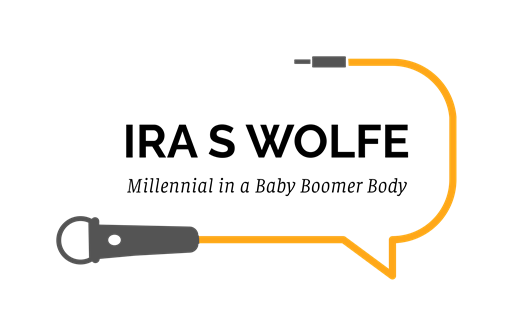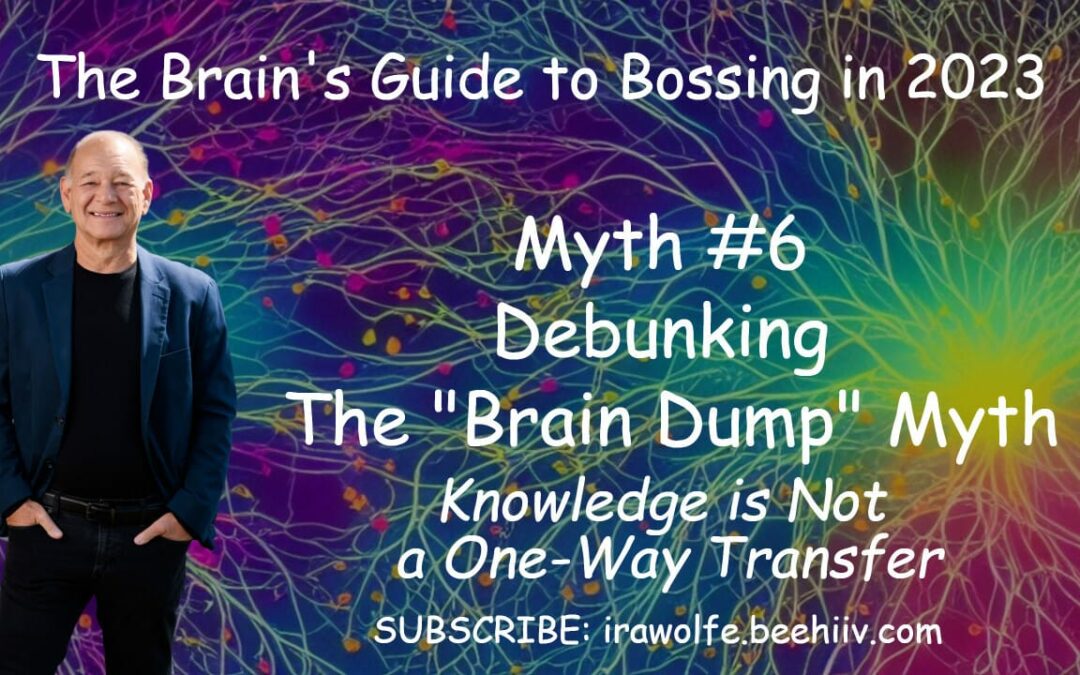Is Knowledge a One-Way Street? Think Again!
Welcome back to my sixth article in my myth busting series that’s all about cracking open the managerial fortune cookie and reading between the lines with a little help from neuroscience! This week, we’re putting on our detective hats to investigate the myth that in the workplace, knowledge flows like a river—from managers, straight down to their teams. Spoiler alert: that’s not how brains, or reality, work!
The Myth: The Great Knowledge Waterfall
Picture this: a manager standing tall at the top of a waterfall, showering wisdom down onto the eager employees waiting below. It’s a pretty picture, but neurologically speaking, it’s more fantasy than fact. Knowledge isn’t a one-way waterfall; it’s more like a bustling two-way street during rush hour. And the status of knowledge transfer in the workplace is in full out crisis mode as employee mobility is on the rise along with the long anticipated Baby Boomer exodus. So until the time comes when we can transfer knowledge from one person to another via an implanted chip, it would be very wise to learn ways to capture and transfer knowledge. Here’s my best shot at it!
The Reality: Our Brains are Chatty Cathys
Enter neuroplasticity, the brain’s charming habit of reorganizing itself, forming new connections at every stage of life. It’s our brain’s way of saying, “I’m flexible, adaptable, and always up for a good chat!” Learning is an intricate tango, where everyone leads and follows in turn.
Tip 1: Cultivate a Gabfest, Not a Monologue
Actionable Insight for Managers & Employees: Bad news for you introverts! Memos and SOPs just won’t cut it. Encourage open dialogue within the team. Managers, your ears are just as important as your voice. Employees, your insights are VIPs, not wallflowers.
Why it Works: Open communication is the tango of the corporate world—a constant give and take that mirrors the brain’s knack for adaptation and growth.
Mistake to Avoid: Managers, don’t play the know-it-all card. It’s a quick way to land in a communication cul-de-sac where your team’s insights don’t get a ticket to the show.
Tip 2: Be the Student and the Teacher
Actionable Insight for Managers & Employees: Launch a ‘Teach Me Something’ day, where everyone, managers included, plays both the student and the professor.
Why it Works: When you teach, you’re actually throwing a party for your brain. It gets to review, consolidate, and celebrate the knowledge it has, and invite new facts to join the bash.
Mistake to Avoid: Managers, don’t set your learning on cruise control. Assuming you’ve graduated from Learning University is like telling your brain it’s in early retirement.
Tip 3: Reflect, Don’t Deflect
Actionable Insight for Managers & Employees: Pencil in regular ‘Thinking Cap’ sessions. Swap stories about what you’ve learned, how your views have been refurbished, and toss in a bit of constructive critique. Employees, this is your golden ticket to give feedback to everyone, managers included.
Why it Works: Reflection is your brain’s version of hitting the gym, flexing its synaptic muscles, and sweating it out to connect new and old knowledge.
Mistake to Avoid: Ignoring feedback is like wearing earplugs during a concert. Managers, if you’re brushing off critiques, you’re missing the main event.
In Summary: Dance, Don’t Dictate
Imagine knowledge sharing as a vibrant tango between brains—nuanced, reciprocal, and enriching for both parties involved. Managers, you’re not just teaching; you’re learning, adapting, and growing right along with your team. Employees, you are not passive receivers of knowledge; you are active, invaluable contributors to the collective wisdom of your team.
In this dance, managers are not the sole bearers of knowledge, and employees are not mere receptacles. Everyone is both a teacher and a learner, and everyone’s brain is continually growing and adapting through this interaction.
So, let’s step away from the notion of one-way knowledge and onto the dance floor of collaborative learning. Our brains are wired for this beautiful, intricate exchange, and it’s high time we embrace it.
Thank you for joining us for this week’s exploration into the fascinating world of management myths and neuroscience. Stay tuned for the next article in our series, an all-time-favorite: “You Can’t Teach an Old Dog New Tricks.” 🎩🎶
Can I Ask A Favor?
Thanks for joining me again as I continue my myth-busting journey through the fascinating labyrinth of the human brain. I hope you’re enjoying my Brain Guide to Bossing series on debunking neuromanagement myths enough to share this with just two connections.
If I didn’t earn your endorsement yet, please let me know what I need to do to improve.
And if you haven’t subscribed, please click here.
Thank you and watch for next week’s myth: what neuroscience has to say about the “photographic memory.”
Secure Your FREE* Copy of My New Book
EVERY EMPLOYEE IN YOUR ORGANIZATION NEEDS A COPY!
It’s part of the fastest growing personal development series in the world.
/
B.Y.O.Brain: Bring Your Whole Brain: Demystifying the Brain
Book a captivating keynote or speaker for your business meeting with me to explore how neuroscience and AI will shape the workforce of tomorrow. Gain invaluable insights and stay ahead of the curve in the ever-evolving world of work. Schedule now or message me to unlock the secrets to future success in the Never Normal.

